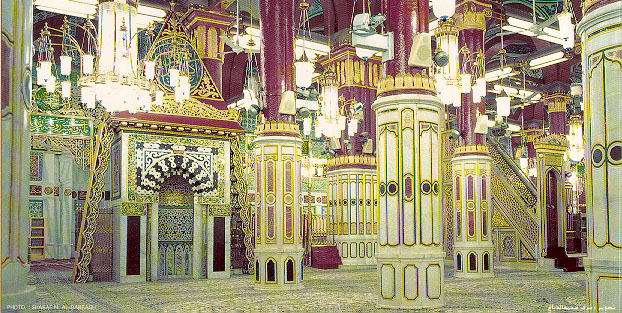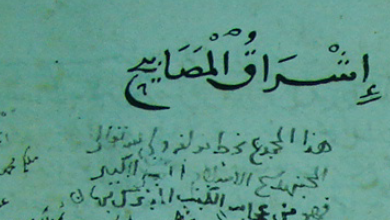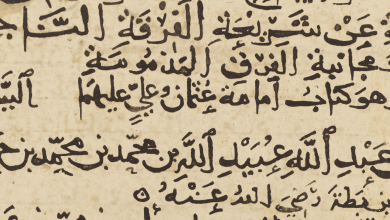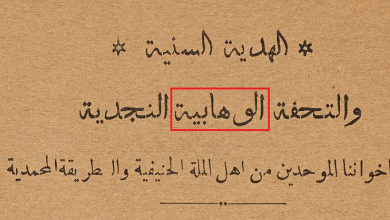Imam Al-Tabari : Allah is not located in a Place
Imam Al-Tabari in his tafsir of Surah Ma’idah verse 120 refutes the Christians and in doing so negates the Pseudo-salafi view that God can be in a place.
للَّهِ مُلْكُ ٱلسَّمَٰوَٰتِ وَٱلأَرْضِ وَمَا فِيهِنَّ وَهُوَ عَلَىٰ كُلِّ شَيْءٍ قَدِيرٌ }
يقول تعالى ذكره: أيها النصارى { لِلَّهِ مُلْكُ السَّمَوَاتِ والأرْضِ }
يقول: له سلطان السموات والأرض، { وَما فِيهِنَّ } دون عيسى الذين تزعمون
أنه إلهكم ودون أمه، ودون جميع من في السموات ومن في الأرض فإن السموات
والأرض خلق من خلقه وما فيهنّ وعيسى وأمه من بعض ذلك بالحلول والانتقال،
يدلان بكونهما في المكان الذي هما فيه بالحلول فيه والانتقال أنهما عبدان
مملوكان لمن له ملك السموات والأرض وما فيهنّ. ينبههم وجميع خلقه على موضع
حجته عليهم ليدبروه ويعتبروه، فيعقلوا عنه. { وَهُوَ على كُلّ شَيْءٍ
قَدِيرٌ } يقول تعالى ذكره: والله الذي له ملك السموات والأرض وما فيهنّ،
قادر على إفنائهن وعلى إهلاكهن وإهلاك عيسى وأمه ومن في الأرض جميعاً كما
ابتدأ خلقهم، لا يعجزه ذلك ولا شيء أراده لأن قدرته القدرة التي لا يشبهها
قدرة وسلطانه السلطان الذي لا يشبهه سلطان ولا مملكة.
A rough translation:
“To Allah doth belong the dominion of the heavens and the earth, and all that is therein, and it is He Who hath power over all things. “
The Exalted said: O Christians “To Allah doth belong the dominion of the heavens and the earth]”, He said: He has sovereignty over the heavens and the earth “and what they contain” without, you claim, ‘Isa (Jesus) whom you consider your God, and without his mother, and without all of those who are in heaven and on earth. The heavens and the earth are a creation from amongst His creations and what they contain – Isa (Jesus) and his mother are part of it. By dwelling in it and displacement (Al hulul wal intiqal) it is proven that they are in a place and, therefore they are two slaves belonging to the One who has sovereignty over the heavens and the earth and all it contains.
……………….
Imām at-Tabarī also says in “Tārīkh al-Umam wa l-Mulūk” (1/3):
لا تحيط به الأوهام، ولا تحويه الأقطار
”The mind can not comprehend him and locations do not contain him.”
………………..
Imam Tabari also says in his Tafsir under the Surah al-A’raf Ayah 127:
{وإنا فوقهم قاهرون}
يقول: وإنا عالون عليهم بالقهر، يعني بقهر الملك والسلطان. وقد بينا أن كل شىء عال بقهر وغلبة على شيء، فإن العرب تقول: هو فوقه.انتهى
‘‘We are subjugators over them.’’ He said: We are above them with subjugation. This refers to subjugation with dominion and power. And we have already shown that everything with subjugation over something else, that the arabs says about it: HE IS ABOVE HIM.
………………..
See also, courtesy of AR Sondalaani, Al Imam Al-Tabari’s understanding of the Highness of Allah, and compare it to what the Pseudo-Salafi theologians say:
In the tafseer of Aayatul Kursi (2:255):
The explanation Al Imam At Tabari gave in his tafseer for the Highness of Allah :
والعلـيّ: ذو العلوّ والارتفـاع علـى خـلقه بقدرته.
And Al ‘Alee: The One possessing Highness and Exaltedness over His creation through His Omnipotence (bi qudratih).
And he also said in his explanation of the name The Exalted or Elevated (Al Muta’aali) {13:9} :
الـمتعال: الـمستعلـي علـى كلّ شيء بقدرته
The Elevated (Al Mutal’aali) He who is elevated over everything in His Omnipotence (bi qudratih)
In both places, his definition of Allah’s Highness was not Him being physically high in Himself (bi Nafsihi) or His essence (bi dhaatihi), but high above everything in power.
Now, compare that to the explanation Al ‘Uthaimeen gave in his ‘Salafi’ tafseer for the Highness of Allah:
الأول: علو الذات؛ بمعنى أنه سبحانه نفسه فوق كل شيء؛
The first (meaning) being Highness of Essence, meaning that He Himself (nefsahu) is above everything, glorified is He.
And Also Al ‘Uthaimeen said in the tafseer of suratul A’laa:
من سورة الأعلى
وأما علو الذات: فهو أن الله تعالى فوق عباده مستو على عرشه،
And as for Highness of Essence (thaat), it means that He is over His servants settled upon His throne.
Can you find a resemblance between the definitions of Highness given by Ibn Jareer At Tabari and Ibn Saalih Al ‘Uthaimeen the ‘Salafi’ scholar?
No. Because there isn’t any.
Courtesy of – HERE






